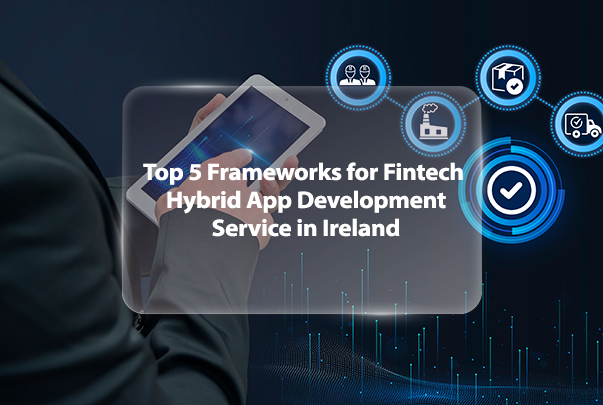The pulse of the financial technology (Fintech) industry in Ireland demands agility and unwavering security. Launching a world-class application on both iOS and Android simultaneously can help Fintech companies benefit from a wider pool of users. Hybrid app development provides the strategic solution, leveraging a single codebase to build robust, high-performance apps that drastically reduce development costs and time-to-market. When speed, compliance, and excellence are paramount, the choice of framework is critical. Partnering with a specialized hybrid app development service in Ireland ensures your choice is informed by local market expertise and global technology standards. We examine the five frameworks driving Fintech innovation today.
1. React Native Offers High-Velocity Consumer Platform
React Native, championed by Meta, remains the dominant force for B2C Fintech applications requiring massive scale and a fluid user experience. It transcends simple web-wrappers by compiling JavaScript/TypeScript code to render genuine native UI components, which is vital for maintaining user confidence in a financial service.
Fintech Application Scope: React Native is the ideal choice for high-frequency user apps like digital wallets, P2P payment services, and retail trading platforms where frequent updates and swift scaling are paramount. Its vast community supports an ecosystem of production-ready components that accelerate development.
Key Technical Differentiator: The framework’s resilience in real-world scenarios is bolstered by modules like @react-native-community/netinfo. This component is critical for reliable transaction processing; it allows the app to actively monitor network connectivity. By enabling the smart queuing of transactions during intermittent service (a common challenge in mobile use), this module prevents data loss and ensures a robust user experience, securing trust through technical dependability.
2. Flutter is Unifying Brand Identity with Pixel-Perfect Precision
Google’s Flutter utilizes the Dart language. It has distinguished itself by focusing on visual perfection and absolute cross-platform consistency. With its own high-speed rendering engine to draw every pixel, it guarantees an application’s design is identical across all devices. This makes it easier for users to have a cohesive UI?UX experience across devices.
Fintech Application Scope: Flutter is the powerhouse for apps where the User Interface (UI) is a core selling point, such as bespoke investment dashboards, complex data visualization tools, and neo-banking apps targeting a modern aesthetic.
Key Technical Differentiator: The framework’s commitment to security and speed is showcased by the LocalAuth Flutter package. This component provides secure, platform-specific biometric authentication (Face ID, Touch ID, or Android equivalent) directly through native APIs. This is a fundamental feature for modern Fintech, allowing users to secure critical actions (like authorizing a transfer or viewing a sensitive portfolio) using a convenient and highly secure native device feature. Flutter’s renowned Hot Reload then enables Irish development teams to iterate on these security and design features with unprecedented speed.
3. Xamarin / .NET MAUI for Enterprise Security
Microsoft’s Xamarin has evolved into .NET Multi-platform App UI (.NET MAUI), offers a security-first approach by leveraging the robust C# language and the versatile .NET ecosystem. This framework is explicitly designed to meet the rigorous demands of enterprise software development, compiling code directly to native binaries.
Fintech Application Scope: This is the natural foundation for large financial institutions, internal B2B banking applications, and wealth management platforms deeply integrated with the Microsoft enterprise stack. Its stability makes it ideal for platforms managing deeply sensitive institutional or customer data under strict regulatory oversight.
Key Technical Differentiator: For applications that must meet the highest security standards, the Xamarin.Essentials / .NET MAUI Essentials: SecureStorage API is indispensable. This API enables developers to securely store sensitive key-value pairs (like authentication tokens or user credentials) directly within the device’s native, hardware-backed secure containers (e.g., iOS Keychain or Android Keystore). This shields locally stored data from other applications and exploitation, reinforcing the enterprise-grade security posture required by Irish and EU financial regulations.
4. Ionic Has Accelerated Prototyping and Web Skill Leverage
Ionic is a highly versatile framework that allows teams to build mobile apps using standard web technologies: HTML, CSS, and JavaScript. It relies on a native container known as the Capacitor, to effectively bridge the web environment with native device functionalities.
Fintech Application Scope: Ionic’s primary value is time-to-market and cost efficiency. It is the ideal engine for quickly developing Minimum Viable Products (MVPs) and proof-of-concept Fintech tools. Furthermore, its excellent support for Progressive Web Apps (PWAs) offers a scalable, browser-accessible alternative, significantly widening the application’s reach for users across Ireland who might not want to download a native app.
Key Technical Differentiator: The Capacitor Geolocation API demonstrates Ionic’s ability to integrate security and utility features seamlessly. Those offering hybrid app development services in Ireland can use the Capacitor Geolocation API to accurately retrieve a device’s location. This API is crucial for enabling features like geo-fencing and fraud detection. Specifically, it supports security processes such as preventing card-not-present fraud or implementing two-factor authentication that is dynamically based on a user’s current geographical location, turning a web-centric approach into a surprisingly sophisticated security solution.
5. Sencha Ext JS Embeds Data Resilience for Complex Financial Analytics
Sencha Ext JS occupies a specialized but vital position in the enterprise Fintech landscape. It is not designed for simple consumer apps but rather for the creation of massive, data-driven web and mobile portals, such as proprietary trading systems, internal risk dashboards, or advanced portfolio management interfaces.
Fintech Application Scope: Sencha is the framework of choice for complex B2B Fintech solutions where a stable, feature-rich interface to massive financial data is the core product. This includes institutional reporting platforms, complex risk modeling tools, and high-density financial analytics dashboards used by power users.
Key Technical Differentiator: Sencha’s legendary strength lies in its Ext.grid.Panel (Data Grid) component. This component is engineered for performance, managing the display and manipulation of millions of records in real-time without degradation. For financial analysts who must rapidly sort, filter, group, and summarise vast amounts of live market data, this resilience is non-negotiable. This high-performance component provides the essential backbone for any professional-grade trading floor or risk management system.
The Decisive Step in Hybrid App Development Service in Ireland
The correct framework is the difference between a functional app and a market-defining product. Your choice must align with your primary goal: scale (React Native), brand consistency (Flutter), regulatory security (Xamarin/MAUI), data complexity (Sencha Ext JS), or speed-to-market (Ionic).
The key to a successful fintech app is in its ability to process diverse transactions, while reducing the overall cost of doing business. Much of it depends on a unified app experience that is easy to navigate and use irrespective of whether a user has an Android or Apple smartphone.
Don’t let the complexity of cross-platform development slow your market entry.
Contact Innoenhance today for a free consultation. As a leading provider of hybrid app development service in Ireland, we will analyse your regulatory needs, performance requirements, and data architecture to recommend and implement the perfect framework, ensuring your Fintech solution is scalable, compliant, and cutting-edge.



